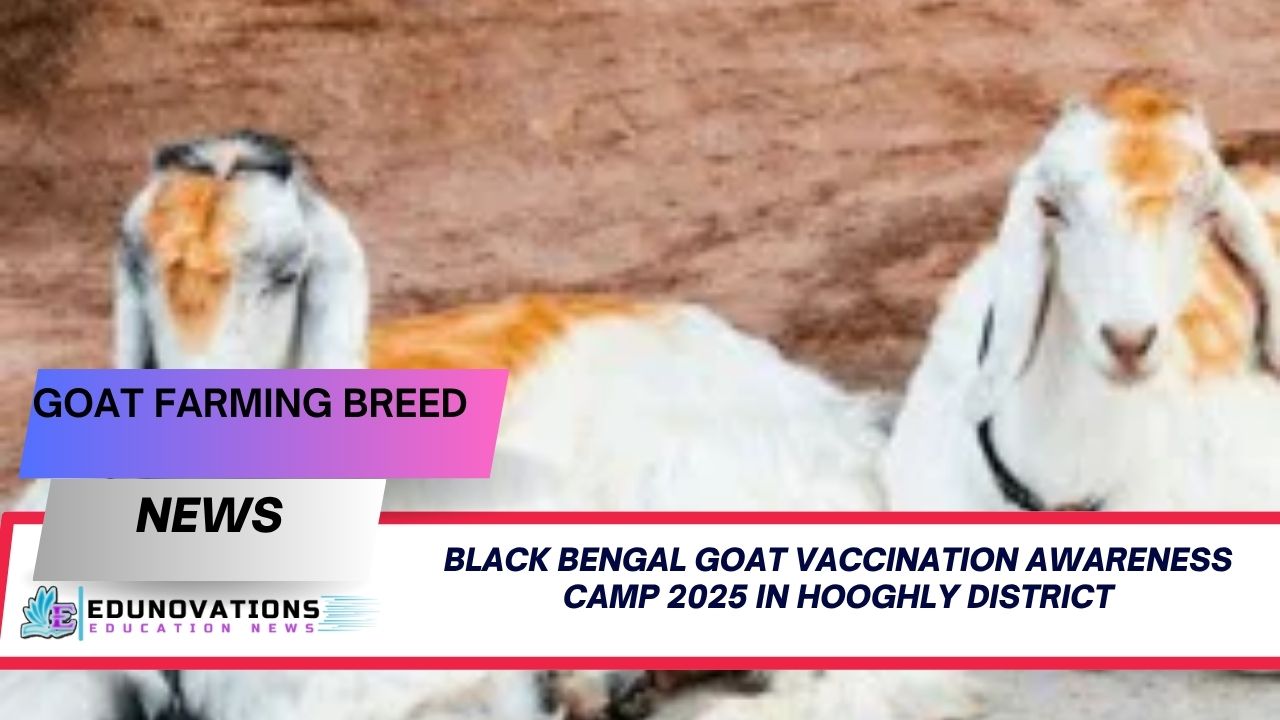Explore how the Black Bengal Goat Vaccination Awareness Camp 2025 in Hooghly District is transforming rural livelihoods through scientific goat rearing and community development.
Introduction
Every year, National Goat Day brings attention to the vital role of goats in India’s agricultural and rural economy. Celebrated with great enthusiasm across livestock research centers and farming communities, National Goat Day 2025 once again highlights the significance of goat farming breed improvement programs India in enhancing productivity, livelihoods, and sustainable rural development.
Goats have always been integral to Indian farming systems, especially for marginal farmers and tribal populations. With evolving challenges such as disease management, climate change, and market demands, breed improvement and innovative livestock development strategies have become crucial. This article delves deep into the multi-faceted efforts driving goat breed enhancement, livestock development, and farmer empowerment that are shaping the future of goat farming in India.
The Importance of Goat Farming Breed Improvement Programs India
Goat farming breed improvement programs in India are designed to increase productivity, improve genetic stock, and enhance disease resistance among indigenous breeds. These programs combine traditional knowledge with modern scientific tools, such as artificial insemination (AI) and molecular breeding technologies, to sustain and enrich the country’s diverse goat population.
Why Focus on Breed Improvement?
- Higher Milk and Meat Yield: Improved breeds produce more milk and meat, directly benefiting farmer incomes.
- Disease Resistance: Selective breeding strengthens goats’ natural defenses, reducing mortality.
- Adaptability: Breeds tailored for different climatic zones thrive better in local environments.
- Economic Empowerment: Enhanced productivity uplifts rural communities and supports women farmers.
Research institutions, including the Indian Veterinary Research Institute (IVRI), have spearheaded various programs to promote the use of superior germplasm and provide farmers with access to high-quality breeding services.
Toppers Use Mind Maps to score more than 95%
NCERT Class 11th Commerce Mind Maps
Add to cartOriginal price was: ₹999.00.₹199.00Current price is: ₹199.00.NCERT Class 12th Chemistry Mind Maps
Add to cartOriginal price was: ₹199.00.₹75.00Current price is: ₹75.00.NCERT Class 12th Commerce Mind Maps
Add to cartOriginal price was: ₹999.00.₹199.00Current price is: ₹199.00.NCERT Class 12th Science Mind Maps
Add to cartOriginal price was: ₹999.00.₹199.00Current price is: ₹199.00.NCERT Mind Maps For Class 10th
Add to cartOriginal price was: ₹999.00.₹199.00Current price is: ₹199.00.
Purchase Today
National Goat Day 2025: Celebrating Livestock Development Initiatives
The celebration of National Goat Day 2025 was marked by a series of awareness camps, farmer workshops, and vaccination drives under the banner of national goat day livestock development initiatives. These programs aim to educate farmers on the latest breeding technologies, animal health management, and marketing strategies.
Key Highlights of 2025 Celebrations
- Vaccination Awareness Camps: To prevent infectious diseases and improve herd health.
- Training on Artificial Insemination: Empowering farmers with knowledge on AI services for goat breeding.
- Distribution of Improved Breeds: Providing farmers with access to superior goat breeds.
- Workshops on Nutrition and Housing: Promoting best practices for goat care.
Such coordinated efforts are designed not only to enhance goat productivity but also to build a self-reliant rural economy through sustainable livestock farming.
Integrated Livestock Development for Goat Farmers: A Holistic Approach
A successful goat farming enterprise depends on a holistic livestock development approach. This involves combining genetic improvements with health care, nutrition, marketing, and financial services.
The concept of integrated livestock development for goat farmers emphasizes:
- Genetic Improvement: Access to quality breeding stock.
- Health Management: Regular vaccinations and veterinary care.
- Feed and Nutrition: Balanced diets tailored to different growth stages.
- Market Linkages: Facilitating better prices and access to markets.
- Capacity Building: Training programs and knowledge dissemination.
Such integration has helped rural farmers increase their incomes and improve their quality of life, turning goat farming into a sustainable livelihood option.
Artificial Insemination Services for Goat Breeding: Revolutionizing Reproduction
One of the transformative tools in goat farming breed improvement programs India is artificial insemination services for goat breeding. AI allows controlled breeding, faster multiplication of superior genetic traits, and disease-free reproduction.
Advantages of AI in Goat Breeding
- Rapid Genetic Gains: Faster dissemination of desirable traits.
- Disease Control: Reduced risk of transmission compared to natural mating.
- Cost-Effective: Lowers the need to maintain multiple bucks.
- Increased Productivity: Produces healthier and more productive offspring.
Government veterinary departments and livestock research centers actively provide AI services, ensuring widespread adoption among goat farmers, especially in remote areas.
Empowering Rural Goat Farming Through AI Technology
The integration of rural goat farming empowerment through AI technology not only includes artificial insemination but also extends to digital platforms for monitoring animal health, breeding cycles, and market information.
Technology-enabled services facilitate:
- Real-Time Veterinary Support: Mobile apps and helplines.
- Data Management: Tracking breeding and vaccination records.
- Market Access: Online platforms connecting farmers to buyers.
- Training & Awareness: E-learning modules and video tutorials.
Such technology adoption boosts efficiency and productivity, ultimately driving economic growth in rural communities dependent on goat farming.
Expert Insights and Statistical Highlights
According to Dr. Anil Kumar, a senior scientist at IVRI, “The focused implementation of goat farming breed improvement programs India is critical to achieving self-sufficiency in animal protein production. It also safeguards the livelihood of millions of marginal farmers, especially women.”
Statistics at a Glance
- India ranks among the top countries globally in goat population, with over 135 million goats.
- Improved breed adoption has shown a 20-25% increase in milk yield.
- Vaccination and AI services have reduced mortality rates by 15-20% in participating regions.
- Goat farming contributes nearly 20% of total livestock income in rural India.
These figures underscore the impact and potential of goat farming breed improvement programs in enhancing rural prosperity.
Linking Goat Farming to Educational Resources and Market Opportunities
For aspiring goat farmers and students, understanding these development initiatives is crucial. Educational platforms like NCERT provide comprehensive courses on animal husbandry and livestock management, which can be accessed to deepen knowledge and practical skills.
- Explore NCERT Courses to learn about animal science.
- Stay updated with the latest in agriculture and livestock via Current Affairs.
- Access detailed Notes on goat farming techniques.
- Test your understanding with related MCQ’s.
- Watch informative Videos explaining breeding and health management.
Furthermore, strengthening market connections is vital. Partnering with authoritative organizations like Mart India Infotech can provide farmers with access to tools, contacts, and marketplaces for their livestock products.
Conclusion: The Road Ahead for Goat Farming in India
The success of goat farming breed improvement programs India exemplifies how science, technology, and community engagement come together to boost rural livelihoods. As National Goat Day 2025 demonstrates, ongoing efforts in breed enhancement, livestock health, and farmer empowerment are creating a resilient and prosperous goat farming sector.
By integrating innovative breeding techniques like artificial insemination, implementing comprehensive development initiatives, and leveraging technology for rural empowerment, India is set to strengthen its position as a global leader in sustainable goat farming.
Frequently Asked Questions (FAQs)
- What are the benefits of goat farming breed improvement programs India?
They enhance productivity, disease resistance, and farmer incomes by introducing superior goat breeds. - How does artificial insemination services for goat breeding work?
AI allows controlled breeding using semen from high-quality bucks, leading to better genetic traits and healthier offspring. - What initiatives are taken on National Goat Day livestock development initiatives?
Activities include vaccination drives, training on breeding technologies, and distribution of improved breeds. - How does integrated livestock development for goat farmers improve rural livelihoods?
It combines breed improvement, health management, nutrition, and market access to create sustainable farming. - What technology supports rural goat farming empowerment through AI technology?
Mobile apps, digital health monitoring, e-learning platforms, and online marketplaces aid farmers. - How can goat farmers access improved breeds in India?
Through government veterinary services and research institutions offering breed distribution programs. - What role does vaccination awareness play in goat farming?
It prevents disease outbreaks, reducing mortality and increasing productivity. - Where can students learn more about goat farming and livestock management?
Educational resources such as NCERT courses, notes, videos, and current affairs provide comprehensive knowledge. - How does goat farming contribute to rural income in India?
It provides meat, milk, and income, especially for small and marginal farmers and women. - Who are key experts supporting goat farming development in India?
Institutes like IVRI and veterinary scientists like Dr. Anil Kumar lead research and outreach programs.














